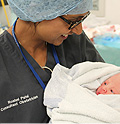Should I have the influenza vaccine?
Understandably, women are concerned about having any vaccinations in pregnancy. It is strongly recommended by national UK organisations that pregnant women have the influenza vaccination. The influenza vaccine is a safe and thoroughly tested vaccine, which is not live and cannot lead to the baby or mother getting influenza.
It’s safe for the mother and not only reduces the chances of catching influenza but also the serious complications associated with it (such as, pneumonia).
Having the vaccine will also protect your baby by decreasing the chances of miscarriage, early birth and low birthweight. It will also give the baby protection against influenza in the first few months of life.
Should I have the whopping cough (pertussis) vaccine?
All pregnant women have been offered the whopping cough vaccine between 28 and 38 weeks of pregnancy since 2012. This is even if they have been vaccinated as a child as the effects of previous vaccines may have worn off. The vaccine is being offered because there has been a dramatic increase in the number of reported cases of whopping cough in the UK. Babies are not vaccinated against whopping cough until they are two months old. This leaves them vulnerable in their first few weeks of life. By having the vaccine, antibodies cross the placenta which will protect your new born baby.
It is a potentially serious condition and babies who contract the condition are at risk of pneumonia and brain damage.
The vaccine has been widely used and there is no evidence of it being harmful. It is not a live vaccine, so women cannot catch whopping cough
Is air travel safe in pregnancy?
Air travel is safe in pregnancy if you have an uncomplicated/ low risk pregnancy. If you want to fly after 28 weeks you will need a letter from your doctor but the airline still have the power to refuse to carry you.
In general terms, long haul flights are safe until about 30 weeks of pregnancy and short haul flights until 36 weeks if you have a single fetus. The guidance for twins is less flexible. The specific rules vary for each airline and it is important to check with them. Not only must you consider how many weeks you will be when you fly, but also how many you’ll be when you return.
If you have any medical problems or are high risk, you should discuss your travel plans with your doctor.
What can be more concern is where you’re flying to? This is something you will need to think carefully about and the risks you are willing to accept. For example, will there be adequate medical facilities nearby and could they look after a pre-term baby? And, if you did deliver early, would you be willing to stay there until the baby was fit to travel. You will also need to ensure that your travel insurance covers pregnancy as many policies exclude this.
Visiting the dentist
Dental problems can occur in pregnancy and bleeding gums are common. It is safe and advisable to have routine appointments in pregnancy. Always inform your dentist if you are pregnant as it may not be obvious in the early stages. They can then modify the treatments if required. For example, dental xrays are usually avoided in pregnancy but there can be occasions when the risks of the xray are outweighed by the benefits if urgent treatment is required.
If you are entitled to NHS care, you will also be entitled for free NHS dental care. You will need to show the dentists either a MATB1 or a prescription exemption certificate as proof.
Diet in pregnancy
In pregnancy, as at any other time, it is important to maintain a health balanced diet. Whilst you may be hungrier, it’s a myth that you need to eat for two. Adjusting your snacks and choosing healthier options can be one way of tackling your hunger without eating excess sweet, fat or processed food.
Foods to avoid in pregnancy
The list of forbidden foods seems to grow as you ask more people for advice. Here is a general list:
Dairy: Unpasteurised milk and cheese, blue veined cheese, mould ripened soft cheeses (e.g. brie, chevre, camembert), raw/uncooked eggs.
Meat: any under-cooked/raw meat, pate, liver.
Fish: some types of fish (marlin, shark, swordfish and limit tuna), raw shellfish, sushi if the fish used has not been frozen
Caffeine: It is advisable to limit caffeine in pregnancy. As a general rule, only one cup of coffee or tea per day
Avoid all supplements containing vitamin A

